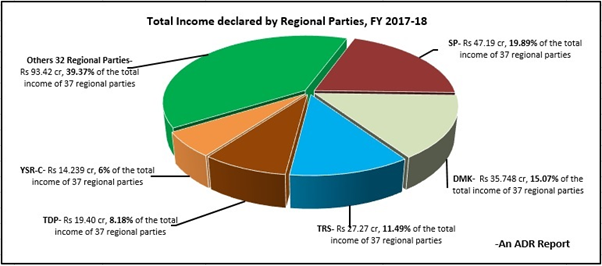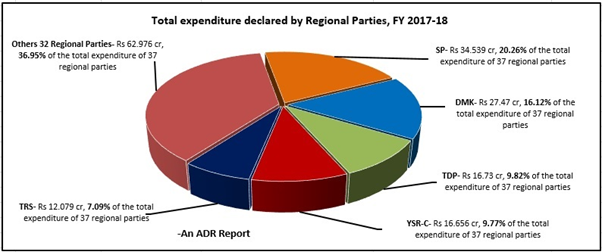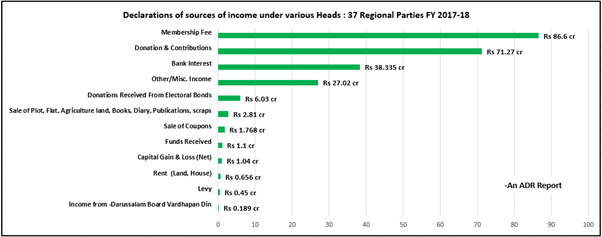Analysis of Income & Expenditure of Regional Political Parties for FY 2017-18
Executive Summary
Political parties have multiple sources of funding and thus accountability and transparency should be an important aspect of their functioning. It is essential to have comprehensive and transparent accounting methods and systems, which should reveal the true financial position of the parties. The Election Commission of India (ECI), in its letter dated 19th November,’14 addressed to the Presidents/General Secretaries of all political parties, stated that it was mandatory for the parties to submit details of their audited reports to the Commission. This report analyses the total income and expenditure incurred, all over India, by the Regional Parties during FY 2017-18, as declared by the 37 parties in their IT Returns submitted to the ECI.
Status of submission of audited reports by the Regional Parties, FY 2017-18
- The due date for submission of annual audited accounts for the parties was 30 Oct, 2018.
- Out of 48 regional parties considered, 20 had submitted their audit reports on time, while 17 have delayed their submission by several days, ranging from 1 day to 110 days. Hence, this report analyses the income and expenditure of 37 Regional Political Parties
- Audit reports of 11 regional parties for FY 2017-18 are unavailable on the website of the ECI, till the date of preparation of this report. This includes some major Regional Political Parties like BPF, JKNC, JKPDP, etc.
Income declared by Regional Parties, FY 2017-18
- The total income of all 37 Regional Parties for the FY 2017-18, was Rs 237.27 cr.
- SP reported having the highest income of Rs 47.19 cr, which forms 19.89% of the total income of all 37 regional parties, closely followed by DMK with an income of Rs 35.748 cr or 15.07% and TRS whose income was Rs 27.27 cr or 11.49% of the total income of 37 regional parties.
- The total income of top 3 parties amounted to Rs 110.21 cr, which comprised 46.45% of the total income of 37 Regional Parties, collectively.
 Chart: Annual income for FY 2017-18 declared by Regional Parties
Chart: Annual income for FY 2017-18 declared by Regional PartiesComparison of Income of Regional Parties, FY 2016-17 and FY 2017-18
- Out of 37 regional parties, 40.54%or 15 parties have shown a decline in their income from FY 2016-17 to 2017-18, while 51.35% or 19 parties have shown an increase in their income. 8.11% or 3 regional parties have not submitted their Income Tax Return to the ECI in FY 2016-17.
- Regional parties who have not submitted their audit report for FY 2016-17 are AJSU, AIFB and JKNPP.
- Total Income of 34 Regional Parties decreased from Rs 409.64 cr in FY 2016-17, to Rs 236.86 cr in FY 2017-18, a decrease of 42% or Rs 172.78 cr.
Unspent Income of Regional Parties, FY 2017-18
- There are 22 regional parties who declared a part of their income as remaining unspent for the year 2017-18 while 15parties spent more than the income collected during the year.
- JDS and JDU have more than 85% of their total income remaining unspent while AIMIM has 63% of its income remaining unspent for FY 2017-18.
- YSR-C has declared spending Rs 2.41 cr more than its income while IUML declared spending Rs 2.06 cr more than their total income.
Expenditure incurred by Regional Parties, FY 2017-18
- The total expenditure of all 37 Regional Parties for the FY 2017-18, was Rs 170.45 cr.
- Top 3 regional parties that have incurred highest expenditure are SP which had spent Rs 34.539 cr, followed by DMKwhich spent Rs 27.47 cr and TDP with Rs 16.73 cr.
- Expenditure incurred by the top 3 political parties is 46.19% of the total expenditure as reported by 37 regional parties.
 Chart: Percentage share of regional parties in their total expenditure, FY 2017-18
Chart: Percentage share of regional parties in their total expenditure, FY 2017-18All sources of Income declared by Regional parties: FY 2017-18
● 37 Regional parties collected 32.58% (Rs 77.30 cr) of their total income from Voluntary contributions (includes Donation & Contributions and Electoral Bonds) for FY 2017-18. Only JDS declared receiving an income of Rs 6.03 cr from Contributions through Electoral Bonds.
● 36.50% or Rs 86.6 cr was income generated through Membership Fee by Regional Parties during FY 2017-18.

Observations and Recommendations of ADR
Observations of ADR
- Out of 48 regional parties considered, the audit reports of UDP is not available for 14 years (between FY 2004-05 and 2017-18) and that of J&K NPP is not available for 13 years (between FY 2004-05 and 2016-17)with the Election Commission of India. Complete reports are available only for 37 Regional Parties, for FY 2017-18.
- 2 regional parties (IUML and KC-M) have defaulted 7 or more times in submitting their audit reports to the ECI,between FY 2004-05 and 2017-18.
- The income tax returns/audit reports of Regional parties were obtained from the ECI. The income tax returns of 14 out of the 48 regional parties (29%) analysed were unavailable at least once between FY 2016-17 and FY 2017-18.
- Audit reports of AJSU, AIFB and JKNPP are unavailable for FY 2016-17 for comparison.
- The Annexure containing ‘Schedules’ of declared income is not available in the Annual Audit Report of Samajwadi Partyfor FY 2017-18 available in the public domain.
- Total Income of 34 Regional Parties decreased from Rs 409.64 cr in FY 2016-17, to Rs 236.86 cr in FY 2017-18, a decrease of 42% or Rs 172.78 cr.
- The expenses of these 34 Regional Parties for the FY 2016-17 was Rs 468.63 cr, this decreased by 63.72% or Rs 298.61 cr to Rs 170.02 cr in FY 2017-18.
- During FY 2017-18 out of the 37 Regional Parties, only JDS has declared receiving an income of Rs 6.03 cr from Contributions through Electoral Bonds.
- During FY 2017-18 out of the 37 Regional Parties, only SAD and JVM-P declared receiving a total income of Rs 1.768 crfrom Sale of Coupons.
- The Supreme Court gave a judgment on September 13, 2013 declaring that no part of a candidate’s affidavit should be left blank. Along the same lines, we recommend that the Election Commission of India impose rules that no part of the Form 24A submitted by political parties providing details of donations above Rs 20,000 should be left blank.
- Full details of all donors should be made available for public scrutiny under the RTI. Some countries where this is done include Bhutan, Nepal, Germany, France, Italy, Brazil, Bulgaria, the US and Japan. In none of these countries it is possible for 75% of the source of funds to be unknown.
- Any party which does not submit its IT returns or donation statement to the ECI on or before the due date, their income should not be tax-exempted and defaulting parties should be derecognized.
- Accounts of Regional parties not following the ICAI guidelines for auditing of reports should be scrutinized by the IT department.
- The Regional political parties must provide all information on their finances under the Right to Information Act. This will only strengthen political parties, elections and democracy.
Recommendations of ADR
- The Supreme Court gave a judgment on September 13, 2013 declaring that no part of a candidate’s affidavit should be left blank. Along the same lines, we recommend that the Election Commission of India impose rules that no part of the Form 24A submitted by political parties providing details of donations above Rs 20,000 should be left blank.
- Full details of all donors should be made available for public scrutiny under the RTI. Some countries where this is done include Bhutan, Nepal, Germany, France, Italy, Brazil, Bulgaria, the US and Japan. In none of these countries it is possible for 75% of the source of funds to be unknown.
- Any party which does not submit its IT returns or donation statement to the ECI on or before the due date, their income should not be tax-exempted and defaulting parties should be derecognized.
- Accounts of Regional parties not following the ICAI guidelines for auditing of reports should be scrutinized by the IT department.
- The Regional political parties must provide all information on their finances under the Right to Information Act. This will only strengthen political parties, elections and democracy.
For details of top three sources of income, top items of expenditure of the Regional Parties and the status of submission of their audit reports for FY 2017-18, kindly Click Here

